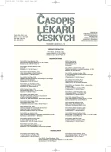Present view on the diagnostics and treatment of nocturia
Authors:
Roman Zachoval 1; Jan Krhut 2; Ondřej Havránek 2; Miroslav Záleský 1
Authors‘ workplace:
Urologické oddělení Fakultní Thomayerova nemocnice, Praha
1; Urologické oddělení Fakultní nemocnice, Ostrava – Poruba
2
Published in:
Čas. Lék. čes. 2010; 149: 576-579
Category:
Review Article
Overview
Nocturia is one of the most bothersome symptoms of lower urinary tract and may be the leading symptom in medical examination. Nocturia has a special aspect of being of multifactorial etiology so an interdisciplinary approach for the diagnosis and treatment is obligatory. At present, nocturia is considered to be a new entity excluded from the symptoms of lower urinary tract and may be a consequence of serious disease. Diagnosis consists of non-invasive methods and the mainstay is the micturition diary. Treatment is based on desmopressin therapy and drugs influencing lower urinary tract in some cases.
Key words:
nocturnal polyuria, micturition diary, antidiuretic therapy, desmopressin.
Sources
1. Schatzl G, et al. Cross-sectional study of nocturia in both sexes: analysis of a voluntary health screening project. Urology 2000; 56 : 71–75.
2. Van Dijk L, et al. Nocturia in the Dutch adult population. BJU Int 2002; 90 : 644–648.
3. Weiss JP, et al. Nocturia. J Urol 2000; 163 : 5–12.
4. Chang SC, et al. Multifactorial nature of male nocturia. Urology 2006; 67(3): 541–544.
5. van Kerrebroeck P, et al. Thinking beyond the bladder: antidiuretic treatment of nocturia. Int J Clin Pract 2010; 64(6): 807–816.
6. Abraham L, et al. Development and validation of a quality-of-life measure for men with nocturia. Urology 2004; 63 : 481–486.
7. Milani S, et al. Lower urinary tract symptoms suggestive of benign prostatic hyperplasia: latest update on alpha-adrenoreceptor antagonists. BJU Int 2005; 95(Suppl 4): 29–36.
8. Yoshimura K, et al. Nocturia nad benign prostatic hyperplasia. Urology 2003; 61(4): 786–790.
9. Asplund R, et al. Oral desmopressin for nocturnal polyuria in elderly subjects: a double-blind placebo-controlled randomized exploratory study. BJU Int 1999; 83 : 591–595.
10. Lose G, et al. Efficacy of desmopressin (Minirin) in the treatment of nocturia: a double-blind placebo-controlled study in women. Am J Obstet Gynecol 2003; 189(4): 1106–1113.
11. Lose G, et al. Clinical experiences with desmopressin for long-term treatment of nocturia. J Urol 2004; 172(3): 1021–1025.
12. Kuo HC. Efficacy of desmopressin in treatment of refractory nocturia in patients older than 65 years. Urology 2002; 59(4): 485-9.
Labels
Addictology Allergology and clinical immunology Angiology Audiology Clinical biochemistry Dermatology & STDs Paediatric gastroenterology Paediatric surgery Paediatric cardiology Paediatric neurology Paediatric ENT Paediatric psychiatry Paediatric rheumatology Diabetology Pharmacy Vascular surgery Pain management Dental HygienistArticle was published in
Journal of Czech Physicians

- Advances in the Treatment of Myasthenia Gravis on the Horizon
- Possibilities of Using Metamizole in the Treatment of Acute Primary Headaches
- Metamizole at a Glance and in Practice – Effective Non-Opioid Analgesic for All Ages
- Metamizole vs. Tramadol in Postoperative Analgesia
- Spasmolytic Effect of Metamizole
-
All articles in this issue
- Demographic view on primary health care physicians in the Czech Republic – present state as the headstone for the future development
- Cancer microenvironment affects biological properties of tumor cells – tumor as an embryologic problem?
- Present view on the diagnostics and treatment of nocturia
- Kidney diseases in pregnancy
- Past, present and future of neuroprotection
- Alcohol in children and adolescents – prevention and treatment
- How smoking influences the young men’s lifestyle at the beginning of the 21st century
- Journal of Czech Physicians
- Journal archive
- Current issue
- About the journal
Most read in this issue
- Kidney diseases in pregnancy
- Past, present and future of neuroprotection
- Demographic view on primary health care physicians in the Czech Republic – present state as the headstone for the future development
- Alcohol in children and adolescents – prevention and treatment
